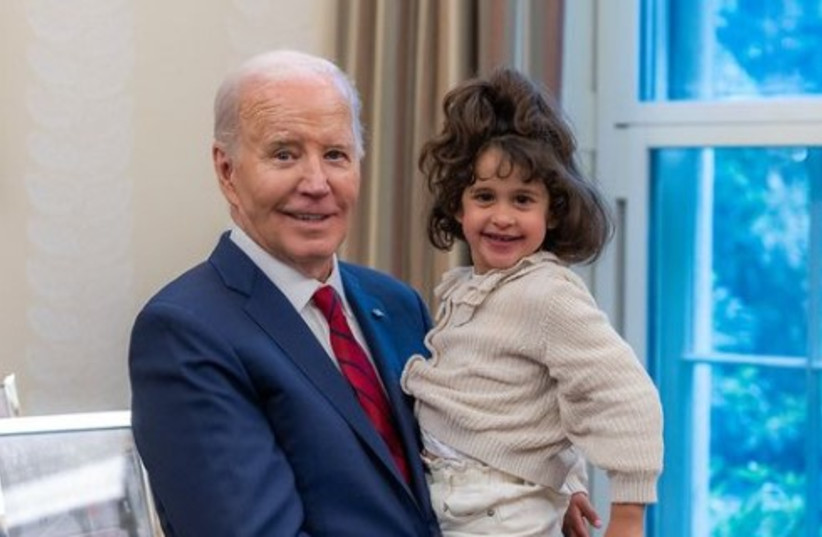On October 7, amid the shock and horror, US President Joe Biden said – in a speech addressed to America, Israel, and the world: “In this moment, we must be crystal clear: We stand with Israel. We stand with Israel. And we will make sure Israel has what it needs to take care of its citizens, defend itself, and respond to this attack. Let me say again – to any country, any organization, anyone thinking of taking advantage of this situation, I have one word: Don’t. Don’t. Our hearts may be broken, but our resolve is clear.”
In a speech on October 10, Biden recounted his first visit to Israel, over 50 years ago, just before the Yom Kippur War. Standing before the press, ready to stand for a photo, then-prime minister Golda Meir “leaned over and whispered to me – she said, ‘Don’t worry, Senator Biden. We have a secret weapon here in Israel… We have no place else to go. We have no place else to go.’” A few days later, a street mural, attributed to Biden, appeared on a corner building in Tel Aviv with those exact words, “We have a secret weapon. We have no place else to go.”
This sentiment – of a hug, of support and backing, of deep strength born of shared values and shared dreams, expressed by Biden in words and some actions – was sorely missing on October 7, most notably from Israel’s own leaders. Into that vacuum, critics noted, stepped Biden, saying those sorely-needed words.
Judaism has an important tenet of hakarat hatov – recognizing the good; recognizing, acknowledging and thanking for the good that has been done. This is, first and foremost, the thing that needs to be said about the outgoing president, after 50 long years of friendship and comradery with Israel.

He has openly and proudly described himself as a Zionist, which is not to be taken for granted. In an interview with Complex Networks’ Speedy Morman on 360 with Speedy, Biden said on July 12 that, “You don’t have to be a Jew to be a Zionist, and a Zionist is about whether or not Israel is a safe haven for Jews because of their history of how they’ve been persecuted.”
Biden's Zionism
This support hasn’t been without its own issues, its own contingencies. The past 50 years aside, there have been rocks and bumps along the way these last nine months.
As Post senior analyst Herb Keinon pointed out, the last three weeks saw Biden – and also Prime Minister Benjamin Netanyahu – in a similar predicament: “they were both facing public opinion that did not want them to continue, yet they both vowed to do so… [they] will cling to power to the end, both men feeling indispensable.”
In Biden’s arc, he heeded the call from inside the party to withdraw from the race, understanding what some other American presidents did: that it is not possible to win a race without ironclad support from your party, and if the party relinquishes it, you don’t stand a chance.
Though his support was strong, there were moments, especially as the election race kicked in, where it seemed like personal political considerations were driving a wedge between Biden and that support, something critics picked up on quite fast. The noise made around the one weapons shipment that was held up, jibes back and forth regarding flexibility on a hostage deal, and apparent pauses in communication between Biden and Netanyahu did not help.
All of this especially does not help Israel from a security perspective. As Post diplomatic correspondent Tovah Lazaroff wrote, “it could not have come at a worse moment… concerning a hostage deal and Iran’s military threat.” His position, right now and for the next six months, is that of a lame duck president, which means that any heat on closing a hostage deal and coalescing a united strong front against Iran will be shaken because of the change in leadership. The hostage deal has been standing on eggshells anyway – and the Iran threat, mostly through its proxies, continues to stand strong.
At the end of the day though, this was a gift. “His steadfast stance on hostages and his unwavering support for Israel’s military actions against Iran have been so consistent that Israelis may not fully appreciate its importance until it’s gone,” wrote Lazaroff.
Though not all American Jews or Israelis agreed with all of his recent actions in the Middle East, Biden is a Zionist at heart in a way that is very much not a given these days – not in global leadership and not necessarily even within the throes of the Democratic Party, certainly not to this degree. For that, we say, todah – thanks.
